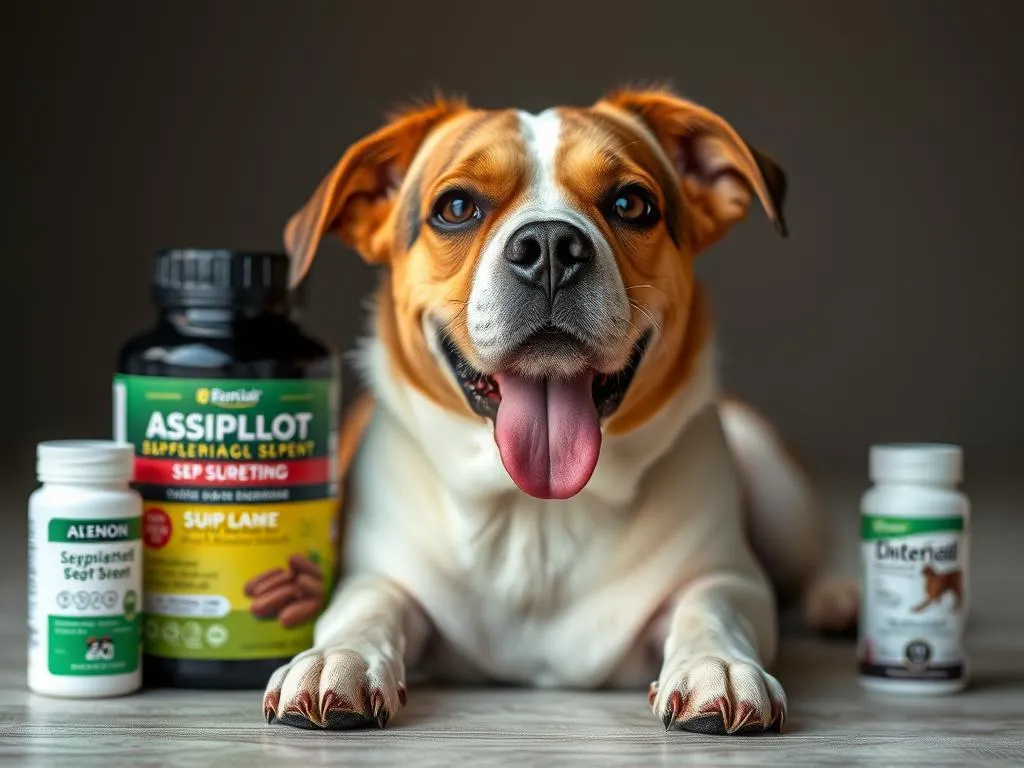
Introduction
Maintaining your dog’s health is a priority for any pet owner, and nutrition plays a vital role in ensuring your furry friend leads a happy and active life. Just as we benefit from vitamins and minerals, dogs can also gain significantly from supplements that enhance their diet and overall wellbeing. This article delves into the best dog supplements, offering insights on how to choose the right ones for your canine companion.
Understanding Dog Nutritional Needs
Basic Nutritional Requirements
Dogs, like humans, require a balanced diet that includes macronutrients and micronutrients.
-
Macronutrients: These include proteins, fats, and carbohydrates. Proteins are crucial for muscle development and repair, fats provide energy and support cell structure, while carbohydrates give dogs the energy they need to play and explore.
-
Micronutrients: Vitamins and minerals are essential for various bodily functions, from bone health to immune support. For example, calcium and phosphorus are vital for strong bones, while B vitamins help in energy production.
It’s important to note that a dog’s nutritional needs can vary significantly based on their age, breed, and any existing health conditions. For instance, puppies require higher protein levels for growth, while senior dogs may need fewer calories but more joint support.
Common Nutritional Deficiencies in Dogs
Recognizing nutritional deficiencies in dogs can be challenging, but certain signs may indicate a lack of essential nutrients:
- Dry, flaky skin or dull coat can suggest a deficiency in fatty acids.
- Poor appetite or lethargy might indicate a lack of vitamins or minerals.
- Frequent gastrointestinal upset could be linked to insufficient fiber or probiotics.
Certain breeds may be predisposed to specific deficiencies, such as large breeds prone to hip dysplasia, which can benefit from joint health supplements.
What Are Dog Supplements?
Definition and Types of Dog Supplements
Dog supplements are products designed to provide additional nutrients that may be lacking in a dog’s regular diet. They come in various forms, including:
- Vitamins: Essential for metabolic functions.
- Minerals: Important for bone health and nerve function.
- Fatty Acids: Such as omega-3s for skin and coat health.
- Probiotics: Beneficial for digestive health.
- Herbal Supplements: Used for various health benefits, such as calming anxiety or improving mobility.
Why Consider Supplements for Your Dog?
Supplements can significantly enhance your dog’s health in several ways:
- Overall Health: They can fill nutritional gaps in a dog’s diet, ensuring they receive all necessary nutrients.
- Specific Health Concerns: Certain dogs may require additional support due to age, lifestyle, or health issues. For example, aging dogs often benefit from joint support supplements, while active breeds may need extra energy support.
The Best Dog Supplements
Essential Supplements for All Dogs
Certain supplements serve as a foundation for a healthy canine diet. These include:
- Multivitamins: Providing a broad spectrum of essential vitamins and minerals.
- Omega-3 Fatty Acids: Supporting skin, coat, and heart health.
Recommended dosages will depend on your dog’s size and specific needs, so always consult your vet for guidance. These supplements can be found in various forms, such as pills, powders, or chewable treats, making them easy to administer.
Supplements for Specific Health Concerns
Joint Health
For dogs suffering from joint pain or at risk of arthritis, glucosamine and chondroitin are vital. These supplements help maintain cartilage and overall joint function.
-
Recommended Products: Look for high-quality glucosamine supplements that combine chondroitin and MSM (Methylsulfonylmethane) for enhanced benefits.
-
Dosage: Generally, a dose of 500 mg of glucosamine and 400 mg of chondroitin daily is recommended for a medium-sized dog, but this can vary.
Skin and Coat Health
A shiny coat and healthy skin are signs of a well-nourished dog. Omega fatty acids, particularly omega-3 and omega-6, play a crucial role in maintaining skin health and reducing inflammation.
-
Recommended Products: Fish oil or flaxseed oil supplements can be effective.
-
Dosage: Follow the manufacturer’s guidelines, but a typical dose for a medium-sized dog might be 1000 mg of fish oil daily.
Digestive Health
Probiotics can help support a healthy gut flora, improving digestion and nutrient absorption. Fiber supplements are also beneficial for maintaining regular bowel movements.
-
Recommended Products: Look for probiotic blends specifically formulated for dogs.
-
Dosage: A daily dose of probiotics typically ranges from 1 to 5 billion CFUs, depending on the product and your dog’s size.
Immune Support
Antioxidants, such as vitamins C and E, can boost your dog’s immune system, helping to protect against illnesses.
-
Recommended Products: Immune support supplements that combine vitamins with herbal ingredients like echinacea can be particularly effective.
-
Dosage: A daily dose of around 250 mg of vitamin C for medium-sized dogs can be beneficial.
Supplements for Puppies vs. Adult Dogs
Puppies have specific nutritional needs that differ from those of adult dogs. They require supplements that support growth and development, particularly in bone and joint health.
- Recommended Supplements for Puppies: Look for puppy-specific multivitamins and ensure they contain calcium and phosphorus for bone health.
For adult dogs, the focus shifts to maintaining health and preventing age-related issues.
How to Choose the Best Dog Supplements
Consulting Your Veterinarian
Before introducing new supplements into your dog’s diet, it’s crucial to consult your veterinarian. They can provide guidance tailored to your dog’s specific health needs and lifestyle.
- Questions to Ask Your Vet:
- What supplements do you recommend for my dog’s age and breed?
- Are there specific brands you trust?
- How do I monitor my dog’s response to supplements?
Evaluating Supplement Quality
Not all supplements are created equal. When evaluating the best dog supplements, consider the following factors:
- Ingredient Sourcing: High-quality ingredients are essential for efficacy.
- Certifications: Look for products that have been tested for purity and potency by third-party organizations.
- Transparency: Brands that openly provide ingredient sourcing and manufacturing processes are typically more trustworthy.
Considering Your Dog’s Unique Needs
Every dog is unique, and their supplement needs can vary. Pay attention to your dog’s breed, age, and health status when selecting supplements.
- Monitoring Responses: After introducing a new supplement, observe your dog for any changes in behavior, coat condition, or energy levels.
Potential Risks and Side Effects
Understanding the Risks of Over-Supplementation
While supplements can be beneficial, over-supplementation can lead to toxicity.
- Signs of Over-Supplementation: Look for symptoms such as lethargy, vomiting, or diarrhea.
Always adhere to recommended dosages to avoid potential health issues.
Allergies and Sensitivities
Some dogs may develop allergies to certain supplement ingredients. Common allergens include:
- Fish: Often found in omega-3 supplements.
- Grains: Present in some multivitamins or chewable forms.
If you notice signs of an allergic reaction, such as itching or gastrointestinal upset, consult your veterinarian immediately.
Testimonials and Case Studies
Success Stories from Dog Owners
Many dog owners have seen significant improvements in their pets’ health through supplementation. For instance, a Labrador Retriever named Max, who struggled with joint pain, showed marked improvement after starting a glucosamine regimen. His owner reported, “Max is back to his playful self, running around like a puppy again!”
Insights from Veterinarians
Veterinarians often recommend supplements based on their clinical experiences. Dr. Jane Smith shares her insight: “I frequently see dogs that benefit from omega fatty acids for skin allergies. A few weeks on the right supplement can make a remarkable difference.”
Conclusion
Choosing the right dog supplements is essential for maintaining your dog’s health and enhancing their quality of life. Always consult with your veterinarian to get personalized advice tailored to your dog’s unique needs. Remember that a balanced diet, coupled with the best dog supplements, can lead to a happier, healthier, and longer life for your furry friend.
By understanding what supplements are available and how they can benefit your dog, you can make informed decisions that contribute positively to their overall wellbeing.









